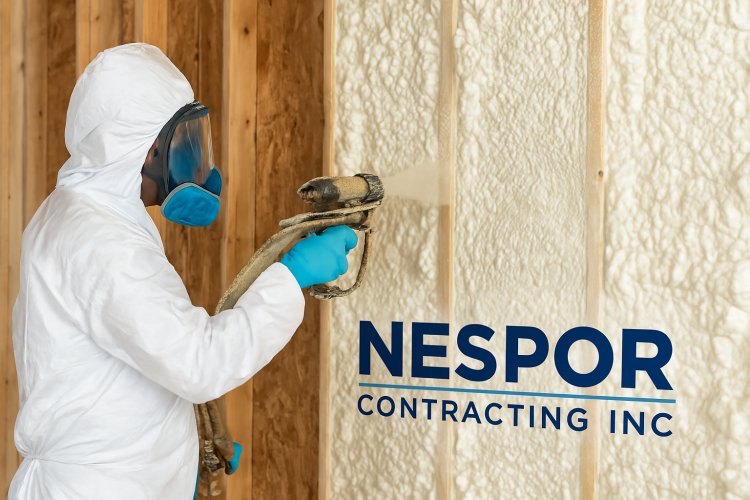Common Misconceptions About Cell Spray Foam Insulation
Nespor Contracting Inc debunks common misconceptions about cell spray foam insulation—learn the facts about its efficiency, safety, and long-term benefits.
 There are several ways to insulate your home; one of the most commonly employed these days is cell spray foam. It is becoming more and more popular because of its many benefits, including energy efficiency as well as simplicity of use. Whether in urban or rural areas, people prefer to include cell spray foam for insulation. Apart from so many benefits, this type of insulation still has certain misconceptions that might cause confusion. This post will look at some common myths and set the record straight.
There are several ways to insulate your home; one of the most commonly employed these days is cell spray foam. It is becoming more and more popular because of its many benefits, including energy efficiency as well as simplicity of use. Whether in urban or rural areas, people prefer to include cell spray foam for insulation. Apart from so many benefits, this type of insulation still has certain misconceptions that might cause confusion. This post will look at some common myths and set the record straight.
Spray Foam Insulation is the Same For Every Home
Among the most common misconceptions is that cell spray foam insulation is a one-size-fits-all solution for any home. Though spray foam insulation offers several benefits, like moisture resistance and air sealing, it is important to understand that different types of foam are suitable for different needs. Closed-cell foam and open-cell foam are the two primary types. Closed-cell insulation—such as high-density closed-cell foam—is denser and more efficient in insulating and sealing than open-cell foam.
Spray Foam Is Only For New Construction
Many believe spray foam insulation is only good during the construction of a new home. However, this is false. Closed-cell insulation spray foam also helps current homes. This adaptability is also enticing for homeowners wanting to enhance the insulation in their older properties. The foam may be injected into walls, attics, and basements without making major structural changes. Spray foam retrofitting can occasionally be more effective than other insulation methods in reality, as it effectively plugs gaps and cracks, hence enhancing air sealing and insulation.
Many Homeowners Think It Is Too Expensive
Another frequent misconception is that spray foam insulation is unaffordable for most homes. Though it may be more expensive initially than traditional insulation options like fiberglass or cellulose, cell spray foam insulation's long-term benefits might warrant the buy. Spray foam insulation helps to greatly cut energy expenditures by providing an outstanding air seal and better temperature management. Ultimately, the savings on heating and cooling costs can offset the initial installation cost, therefore making it a rather affordable option in the long run.
Maintaining Spray Foam Insulation Is Somewhat Challenging
Many believe that once closed-cell insulation is in place, it requires ongoing maintenance. In reality, spray foam insulation is among the most low-maintenance insulating options available. The foam is durable and might endure for many years without the need for replacement or upkeep. Unlike traditional insulating materials, spray foam preserves its effectiveness as it does not settle or move with time. Installed properly, it might provide constant insulation for the lifetime of your home.
Spray foam insulation is not environmentally friendly.
Spray Foam Insulation Is Not Environmentally Friendly
Many individuals think high-density closed-cell foam is not environmentally friendly because it is made of chemicals. But it is not true at all. Advanced developments in spray foam technology have led to more ecologically beneficial alternatives. Furthermore, many manufacturers now provide spray foam made from renewable resources and devoid of hazardous chemicals. By boosting a building's efficiency, spray foam insulation truly helps to reduce energy usage, hence making it more environmentally friendly than other traditional options.

My Home Will Be Too Tight With Spray Foam Insulation
Many assume that cell spray foam insulation will make your home too tight, hence affecting air quality or lack of ventilation. Though spray foam offers an airtight seal, it is vital to balance this with suitable ventilation. Homes insulated with spray foam can have mechanical ventilation systems such as HRVs (Heat Recovery Ventilators) or ERVs (Energy Recovery Ventilators) installed to ensure good interior air quality. By maintaining energy efficiency and introducing fresh air, these systems prevent the buildup of interior pollutants or dampness.
Spray Foam Insulation Does Not Help With Soundproofing
Many think high-density closed-cell foam only provides thermal insulation and offers no soundproofing advantages. Conversely, spray foam insulation assists pretty well with soundproofing. The dense nature of closed-cell foam helps to prevent sound transmission between rooms or from outside sounds. Though it may not provide the same level of soundproofing as specialty materials, when paired with other materials, it may still significantly improve the acoustics of a home.
Endnotes
Undoubtedly, several cell spray foam misconceptions might have led to confusion. Knowing the real benefits and applications of high-density closed-cell foam insulation will help you to choose more sensibly whether it is suitable for your home. Dispelling these misconceptions will enable you to see that spray foam insulation is not only a fast and effective option but also a long-term investment in the comfort as well as energy efficiency of your home. So, what are you thinking?
What's Your Reaction?
















.jpg)
.jpg)

